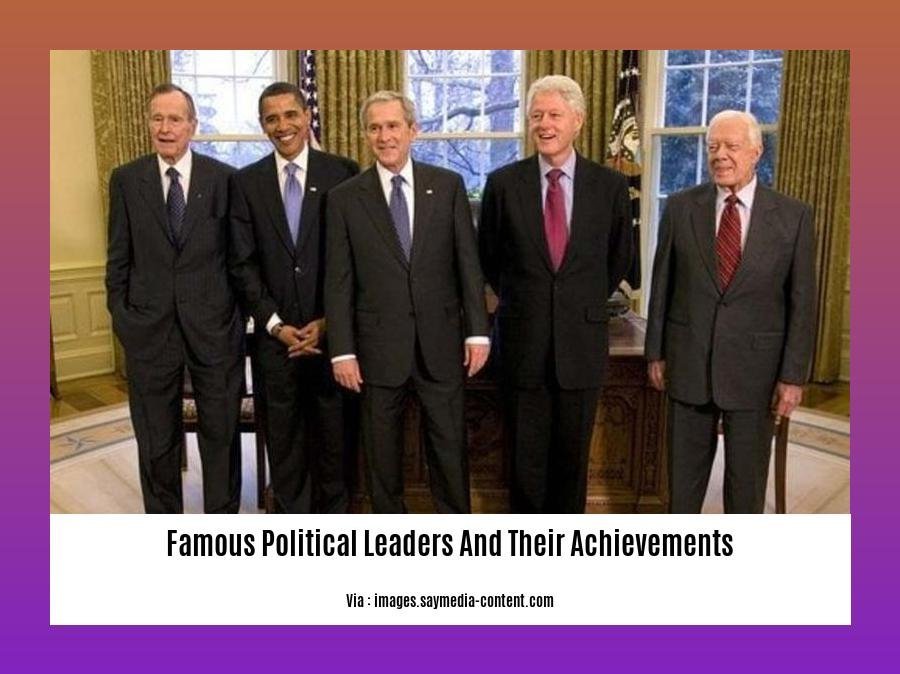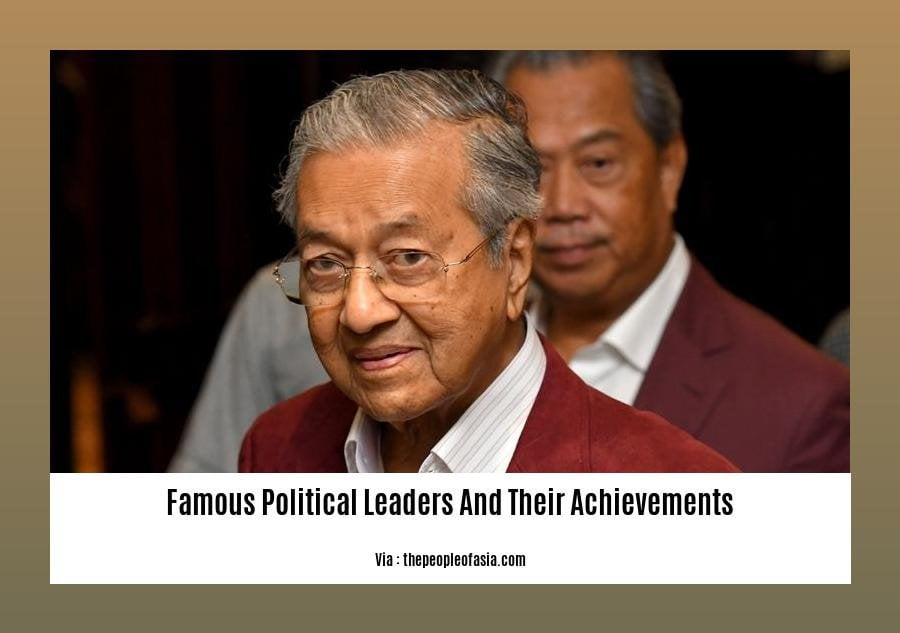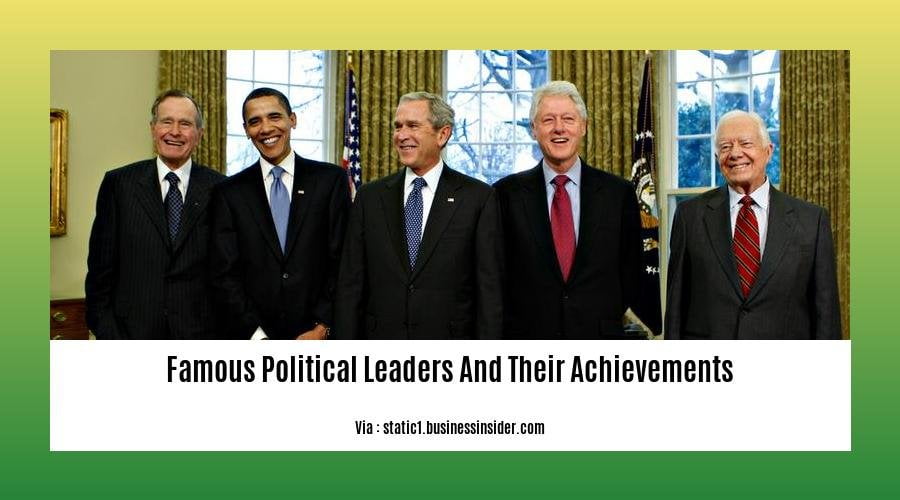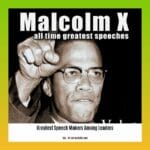In the annals of history, the legacies of great political leaders continue to inspire and shape our world. From Mahatma Gandhi’s nonviolent resistance to Martin Luther King Jr.’s fight for civil rights, Nelson Mandela’s triumph over apartheid to Abraham Lincoln’s preservation of the Union, these iconic figures left an enduring impact on societies and the course of human events. In this article, we delve into the remarkable achievements of these famous political leaders and explore the profound influence they continue to wield on our world today.
Key Takeaways:

- Qin Shi Huang unified China, but his ruthless tyranny overshadowed his achievements.
- Alexander the Great established a vast empire spanning from Greece to India.
- Pericles ushered in Athens’ Golden Age of intellectual and artistic prosperity.
- Julius Caesar transformed Rome from a republic to an empire.
- Hatshepsut was one of ancient history’s exceptional female pharaohs.
- Barack Obama’s presidency focused on healthcare, foreign policy, and environmental advocacy.
- Cleopatra VII’s intelligence, beauty, and political skills made her a notable figure.
- Nelson Mandela fought against apartheid in South Africa.
- Martin Luther King Jr. advocated for African American civil rights.
Famous Political Leaders and Their Achievements
When we think of famous political leaders and their achievements, we can’t help but marvel at the magnitude of their impact on history. These individuals have shaped nations, inspired movements, and left an enduring legacy that continues to resonate today.
Qin Shi Huang: Unifier of China
Qin Shi Huang, the first emperor of a unified China, standardized writing, currency, and weights and measures. He also constructed the Great Wall of China, one of the most iconic structures in the world. Despite his ruthless reign, Qin Shi Huang’s contributions to Chinese civilization remain undeniable.
Alexander the Great: Conqueror of the Known World
Alexander the Great, King of Macedonia, established an empire that stretched from Greece to India. His military brilliance and diplomatic skills enabled him to conquer vast territories and spread Hellenistic culture throughout the ancient world.
Pericles: Golden Age of Athens
Pericles, a Greek statesman, oversaw the Golden Age of Athens. During his leadership, Athens flourished intellectually and artistically, becoming a beacon of democracy and culture. Pericles’ patronage of the arts and his commitment to civic engagement left a lasting legacy on Western civilization.
Julius Caesar: Transformation of Rome
Julius Caesar, a Roman dictator, played a pivotal role in the transformation of Rome from a republic to an empire. His military victories expanded Roman territory, and his political reforms laid the foundation for the Roman Empire. Caesar’s legacy continues to inspire and intrigue historians today.
Hatshepsut: Female Pharaoh of Egypt
Hatshepsut, an Egyptian pharaoh, was one of the few female rulers in ancient history. She oversaw a period of prosperity and stability, and her reign was marked by architectural achievements, such as the Temple of Karnak. Hatshepsut’s legacy as a powerful and successful female leader remains an inspiration to women around the world.
Barack Obama: Change in America
Barack Obama, the 44th President of the United States, is known for his healthcare reforms, foreign policy initiatives, and environmental advocacy. His presidency marked a significant shift in American politics, and his legacy continues to be debated and analyzed.
Cleopatra VII: Queen of Egypt
Cleopatra VII, Queen of Egypt, was renowned for her intelligence, beauty, and political skills. She played a significant role in the Roman-Egyptian rivalry and remains an iconic figure in history. Cleopatra’s legacy as a cunning and charismatic ruler continues to fascinate people today.
Nelson Mandela: Anti-Apartheid Struggle
Nelson Mandela, a South African anti-apartheid activist, led the fight against racial segregation in his country. His unwavering resilience and belief in forgiveness and reconciliation inspired people worldwide. Mandela’s legacy as a beacon of hope and equality continues to guide the fight against oppression and injustice.
Martin Luther King Jr.: Civil Rights Movement
Martin Luther King Jr., an American activist, was a key figure in the civil rights movement. His nonviolent approach and eloquent speeches advocated for equal rights for African Americans. King’s legacy as a champion of justice and equality remains an inspiration to people of all races and backgrounds.
These are just a few examples of the many famous political leaders and their achievements. Their legacies continue to shape our world today, inspiring us to strive for greatness, overcome adversity, and make a positive impact on society.
Get the inside scoop on the extraordinary achievements that led renowned political leaders to their legendary status. Journey through the annals of history and traverse the tales of their greatest feats and illustrious legacies, meticulously chronicled for your enlightenment. Discover the renowned political leaders’ major feats that have shaped the destiny of nations and left an enduring mark on the annals of political leaders and their claims to fame. Join this captivating voyage to unveil the greatest accomplishments of famous leaders that resonate throughout time.
4. Nelson Mandela
Nelson Mandela’s story is a beacon of resilience, hope, and the power of forgiveness. His journey from political prisoner to revered global leader is a testament to his unwavering commitment to justice and equality.
Mandela’s life was marked by the horrors of apartheid, yet he chose the path of non-violent resistance, believing that violence only breeds more violence. Imprisoned for 27 years, he never lost sight of his vision of a free and democratic South Africa.
Upon his release, Mandela led the transition from apartheid to multiracial democracy, playing a pivotal role in establishing the Truth and Reconciliation Commission to confront the atrocities of the past. He used his presidency to promote reconciliation and economic justice, leaving an enduring legacy as a symbol of unity and healing.
Key Takeaways:
- Mandela’s unwavering commitment to non-violence and forgiveness inspired a nation.
- His leadership in establishing the Truth and Reconciliation Commission fostered reconciliation and healing.
- Mandela’s economic policies aimed to address racial inequalities and promote prosperity for all.
- His constitutional reforms enshrined the principles of multiracial democracy and human rights.
- Mandela became a global advocate for peace, democracy, and human rights, leaving a lasting impact on the world stage.
Citation: Nelson Mandela: 12 Important Achievements – World History Edu
7. Abraham Lincoln
Abraham Lincoln, the 16th President of the United States, is remembered for his pivotal role in preserving the Union during the Civil War and his unwavering commitment to abolishing slavery. His leadership left an indelible mark on American history, solidifying his status as one of the nation’s most revered presidents.
Key Achievements:
- Preservation of the Union: Lincoln’s unwavering determination to maintain the Union led to his victory in the Civil War, preventing the nation’s fragmentation.
- Emancipation of Slaves: The Emancipation Proclamation, issued by Lincoln in 1863, freed all slaves in Confederate-held territory, marking a significant step towards the abolition of slavery.
- Modernization of the American Economy: Lincoln’s policies, such as the establishment of the U.S. Department of Agriculture and the implementation of the Homestead Act, contributed to the modernization and expansion of the American economy.
Leadership Qualities:
- Courage and Resilience: Lincoln faced immense adversity during his presidency, including the outbreak of the Civil War and the assassination of his predecessor. Despite these challenges, he remained resolute in his convictions.
- Compassion and Empathy: Lincoln’s empathy and understanding of the human condition were evident in his policies and speeches, particularly his famous Gettysburg Address.
- Political Savvy: Lincoln’s keen political instincts and ability to navigate complex political landscapes enabled him to effectively lead the nation during a time of crisis.
Enduring Legacy:
Lincoln’s legacy as a transformative leader continues to inspire generations. His unwavering determination, moral compass, and commitment to unity left an enduring mark on American society, shaping the nation’s path towards progress and equality.
Citation:

FAQ
Q1: What were Mahatma Gandhi’s key achievements?
A1: Mahatma Gandhi, a prominent figure in the Indian independence movement, is renowned for his advocacy of nonviolent resistance, known as Satyagraha. He played a pivotal role in India’s struggle for independence from British colonial rule.
Q2: What is Martin Luther King Jr. best known for?
A2: Martin Luther King Jr., an influential civil rights leader in the United States, is remembered for his nonviolent approach to fighting for racial equality. He led the Montgomery Bus Boycott and delivered his iconic “I Have a Dream” speech during the March on Washington for Jobs and Freedom.
Q3: What was Nelson Mandela’s role in the anti-apartheid movement?
A3: Nelson Mandela, a South African anti-apartheid activist, spent 27 years in prison for his resistance against the oppressive apartheid regime. Upon his release, he became the first president of a democratic South Africa, leading the country through a peaceful transition from racial segregation to multiracial democracy.
Q4: What were Abraham Lincoln’s major accomplishments as president?
A4: Abraham Lincoln, the 16th President of the United States, is primarily known for his leadership during the American Civil War, where he played a crucial role in preserving the Union. He also issued the Emancipation Proclamation, freeing all slaves in Confederate-held territory.
Q5: What was Cleopatra VII’s significance in ancient Egypt?
A5: Cleopatra VII, Queen of Egypt, is remembered for her intelligence, beauty, and political skills. She was the last pharaoh of Egypt and played a significant role in maintaining Egypt’s independence during a time of Roman expansion.
- Unveiling the Enigma: Mansoureh Khojasteh Bagherzadeh’s Public Appearances & Private Life in Iran - July 18, 2025
- Unveiling the Mystery: Mansoureh Khojasteh Bagherzadeh’s Husband: A Rare Glimpse into a Private Life - July 18, 2025
- Unveiling Masoud Khamenei’s Mother: Power, Influence, and Iran’s Future - July 18, 2025
















